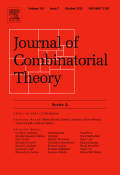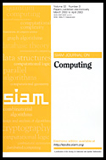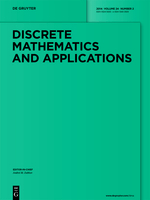
Advances in Mathematics of Communications
Scope & Guideline
Championing Excellence in Applied Mathematics and Algebra
Introduction
Aims and Scopes
- Coding Theory:
The journal publishes research on various coding techniques including linear codes, BCH codes, MDS codes, and cyclic codes, emphasizing their properties, constructions, and applications in error correction and data transmission. - Cryptography:
A significant focus is placed on cryptographic methods and protocols, including public-key systems, hash functions, and post-quantum cryptography, reflecting the growing need for secure communication in the digital age. - Algebraic Structures:
Research on algebraic structures related to coding and cryptography is prevalent, covering topics such as group theory, finite fields, and polynomial functions, which are foundational for developing new coding and cryptographic techniques. - Algorithm Development:
The journal encourages contributions that advance algorithmic approaches for solving problems in coding theory and cryptography, including decoding algorithms, complexity analysis, and optimization techniques. - Interdisciplinary Applications:
There is a notable emphasis on the interdisciplinary applications of mathematical theories in real-world scenarios, particularly in computer science, information theory, and network communications.
Trending and Emerging
- Post-Quantum Cryptography:
With the advent of quantum computing, there is a significant increase in research focused on developing cryptographic systems that can withstand quantum attacks, making this a critical area of exploration. - Machine Learning Applications:
The integration of machine learning techniques in coding theory and cryptography is gaining momentum, with new methodologies being developed to enhance code design and cryptographic security. - Algebraic Geometry Codes:
There is a resurgence of interest in algebraic geometry codes, which leverage geometric properties for constructing error-correcting codes, reflecting their relevance in modern communication systems. - Network Coding:
Research on network coding has gained traction, particularly in optimizing data transmission in networks, leading to innovative solutions for efficient communication. - Secure Multi-Party Computation:
Emerging work in secure multi-party computation reflects the growing interest in privacy-preserving techniques that allow multiple parties to compute functions without revealing their inputs.
Declining or Waning
- Classical Coding Techniques:
While foundational coding techniques remain important, there has been a noticeable decline in research focusing solely on classical coding methods without incorporating newer approaches or hybrid systems. - Basic Cryptographic Protocols:
Research on basic cryptographic protocols appears to be waning, with a shift towards more complex and secure systems, particularly those addressing post-quantum security challenges. - Static Error-Correcting Codes:
The focus on static error-correcting codes without consideration of dynamic or adaptive systems has decreased, as newer research emphasizes the need for codes that can adapt to varying communication conditions. - Geometric Coding Approaches:
There has been a reduction in publications related to geometric coding methods, which traditionally focused on applications in specific communication channels, as researchers now explore broader and more generalized frameworks.
Similar Journals

JOURNAL OF COMBINATORIAL THEORY SERIES A
Fostering Breakthroughs in Computational Inquiry.JOURNAL OF COMBINATORIAL THEORY SERIES A, published by Academic Press Inc. Elsevier Science, stands as a pivotal platform for researchers in the realm of combinatorial mathematics and theoretical computer science. With an impact factor that underscores its influence and a well-respected reputation reflected in its rapid ascent to Q1 rankings in discrete mathematics and computational theory, this journal serves as a critical resource for academics seeking to advance their understanding of complex combinatorial structures and algorithms.
Founded in 1971, the journal covers a wide spectrum of topics within combinatorial theory, providing a robust forum for innovative research and theoretical advancements until 2025. Including a strong position in the Scopus rankings—notably, it ranks #10 out of 92 in discrete mathematics—the journal is essential for both emerging scholars and established professionals committed to pushing the boundaries of mathematical and computational inquiry. Researchers are encouraged to submit their findings to this esteemed publication, as it offers a non-open-access model that ensures rigorous peer review and high visibility within the academic community.

SIAM JOURNAL ON COMPUTING
Exploring Theoretical Breakthroughs in Computing.Welcome to the SIAM Journal on Computing, a premier publication of SIAM Publications dedicated to advancing the field of computational science. Established in 1984, this journal provides a platform for groundbreaking research and theoretical advancements that shape the landscape of both Computer Science and Mathematics. With an impressive impact factor and consistently ranking in Q1 quartiles for its categories, the journal remains an essential resource for scholars looking to contribute to innovative computational theories and methodologies. Although not currently an open-access journal, the SIAM Journal on Computing offers rigorous peer-reviewed articles, ensuring high-quality contributions that appeal to researchers, professionals, and students alike. As we converge towards 2024, this journal continues to play a vital role in influencing future research directions and fostering an academic community devoted to the exploration of computational challenges. Join us in exploring the forefront of computing research!

JP Journal of Algebra Number Theory and Applications
Unveiling the Mysteries of Mathematics Through Peer ReviewJP Journal of Algebra Number Theory and Applications is a distinguished publication within the field of mathematics, specifically focusing on algebra and number theory. Published by PUSHPA PUBLISHING HOUSE, this journal serves as a platform for researchers and professionals to disseminate their cutting-edge findings and innovative methodologies. With its ISSN 0972-5555, it caters to an audience eager to explore mathematical concepts and applications that impact various scientific domains. Although it operates on a subscription model, the journal's commitment to high-quality peer-reviewed content makes it a valuable resource for students and scholars alike. The journal offers an exclusive insight into the complex interplay between algebra and number theory, ensuring that it remains at the forefront of mathematical discourse despite its coverage discontinuation from Scopus. The absence of an H-Index and low rankings within Scopus underscore the challenges the journal faces in a competitive academic landscape; however, it continues to foster a community for the exchange of ideas and the advancement of knowledge in mathematics.

FUNDAMENTA INFORMATICAE
Exploring the Synergy of Computer Science and Algebra.FUNDAMENTA INFORMATICAE is a distinguished academic journal published by IOS PRESS, focusing on the critical intersection of informatics, mathematics, and computer science. Since its inception in 1988, this journal has served as a vital resource for researchers and professionals alike, providing a platform for innovative studies in Algebra and Number Theory, Computational Theory and Mathematics, Information Systems, and Theoretical Computer Science. With an impressive HIndex, and ranking in the Q3 and Q4 categories across various disciplines as of 2023, it underscores its contribution and relevance in advancing the body of knowledge in these fields. The journal's commitment to excellence is reflected not only in its rigorous peer-review process but also in its notable rankings on Scopus, which positions it favorably among its peers. Though not yet available as an open access journal, FUNDAMENTA INFORMATICAE remains a crucial academic venue for authors wishing to disseminate their findings to a global audience, promoting collaboration and further research within the scientific community.

International Journal of Mathematics and Computer Science
Elevating Knowledge in Applied and Theoretical MathematicsThe International Journal of Mathematics and Computer Science (ISSN: 1814-0424, E-ISSN: 1814-0432), published by Lebanese University, serves as a vital platform for disseminating innovative research and advancements in the fields of mathematics and computer science. With a compelling range of topics including Algebra, Applied Mathematics, Computational Mathematics, and Statistical Analysis, this journal caters to a broad audience of researchers, professionals, and students. Spanning the years from 2017 to 2025, it has established a presence in several key quartiles, including Q3 rankings in Applied Mathematics and Computational Mathematics, and a Q4 ranking in Algebra and Number Theory. While currently not an open-access journal, it provides valuable insights through its rigorous peer-reviewed process, enhancing its relevance in both theoretical and applied domains. Furthermore, its presence in Scopus rankings reflects its commitment to quality, making it an essential resource for anyone looking to explore the intersection of mathematics and computer science.

Problems of Information Transmission
Unraveling Complexities in Information SystemsProblems of Information Transmission, an esteemed journal published by PLEIADES PUBLISHING INC, serves as a critical platform for scholarly discourse in the fields of computer networks, communications, computer science applications, and information systems. Established in 1972 and resuming publication from 2005 to 2024, this journal provides a rigorous peer-reviewed environment for researchers to present their findings, methodologies, and innovative applications. With a noteworthy impact factor and categorized as Q3 in several relevant fields in 2023, it ranks within the 30th percentile amongst its peers, indicating its established presence in the academic community. Although the journal is not open access, it remains an essential resource for professionals and students seeking to explore contemporary challenges and advancements in information transmission. For those pursuing knowledge in these dynamic areas, Problems of Information Transmission represents a significant and authoritative source of cutting-edge research and insights.

Algebra And Discrete Mathematics
Bridging Classical and Contemporary Mathematical TheoriesAlgebra And Discrete Mathematics, published by LUHANSK TARAS SHEVCHENKO NATIONAL UNIVERSITY, is a pivotal academic journal dedicated to exploring the realms of algebra and discrete mathematics. Since its inception in 2012, this journal has contributed significantly to the mathematical community, catering to researchers, professionals, and students interested in advancing their understanding of both classical and contemporary mathematical theories. With categories placed in Q4 in Algebra and Number Theory and Q3 in Discrete Mathematics and Combinatorics, and rankings that place it among various domains with percentiles reflecting its niche status, the journal offers a platform for innovative and high-quality research. While the journal is currently not open access, it maintains a robust academic presence, and its continuous publication until 2024 ensures a steady stream of scholarly discourse. Researchers and academics keen on disseminating their findings or keeping abreast of the latest developments in these mathematical fields will find valuable insights and diverse methodologies within its pages.

Discrete Mathematics and Applications
Empowering Research in Discrete Mathematics and Its Applications.Discrete Mathematics and Applications, published by WALTER DE GRUYTER GMBH, is a vital academic journal catering to the expansive fields of Discrete Mathematics and Applied Mathematics. With an ISSN of 0924-9265 and an E-ISSN of 1569-3929, it serves as a reputable platform for disseminating innovative research and developments within these domains. The journal has been contributing to the academic landscape since its inception in 1991 and continues to actively publish impactful studies through 2024. Despite its current positioning in Q4 of both the Applied Mathematics and Discrete Mathematics and Combinatorics categories, the journal is dedicated to fostering essential discussions that advance understanding and application of discrete mathematical concepts. It provides researchers, professionals, and students with access to a wealth of knowledge, encouraging collaboration and growth within the field. With its strategic German headquarters in Berlin and a focused aim to enhance the visibility and significance of discrete mathematics in real-world applications, Discrete Mathematics and Applications stands out as an important resource for those seeking to contribute to the ongoing evolution of mathematical sciences.

Prikladnaya Diskretnaya Matematika
Bridging Theory and Application in Discrete Mathematics.Prikladnaya Diskretnaya Matematika, published by the PUBLISHING HOUSE SCIENTIFIC & TECHNICAL LITERATURE in the Russian Federation, serves as a vital resource for scholars and practitioners in the realms of applied mathematics, computational theory, and discrete mathematics. With an ISSN of 2071-0410 and an E-ISSN of 2311-2263, this journal has been actively contributing to the academic discourse since its inception in 2016, with expectations to continue until at least 2024. Although currently positioned in the Q4 category across several disciplines—including applied mathematics, computational theory, and signal processing—this journal offers a unique opportunity for researchers to contribute to an evolving field, despite facing competitive rankings in the Scopus database. The open access nature of the journal reflects a commitment to disseminating knowledge broadly, albeit details regarding access options remain unspecified. As a publication dedicated to fostering innovation and collaboration in theoretical and practical applications, Prikladnaya Diskretnaya Matematika plays an important role in advancing mathematical theories and practices, making it pertinent for those engaged in research and application within these critical domains.

CANADIAN JOURNAL OF MATHEMATICS-JOURNAL CANADIEN DE MATHEMATIQUES
Exploring the frontiers of mathematical research.Canadian Journal of Mathematics - Journal Canadien de Mathématiques is a prestigious peer-reviewed journal published by Cambridge University Press, which aims to advance the field of mathematics through the dissemination of high-quality research articles. With its ISSN 0008-414X and E-ISSN 1496-4279, the journal plays a pivotal role in fostering mathematical research and collaboration. It has been recognized for its impactful contributions, currently holding a category quartile ranking of Q2 in Mathematics (miscellaneous) for 2023 and sits in the 66th percentile among its peers according to Scopus rankings. As the journal continues its convergence from its inception in 1994 through to 2024, it remains a vital resource for researchers, professionals, and students seeking to stay at the forefront of mathematical developments. The journal does not operate under an open access model, allowing for a curated collection of articles that adhere to rigorous academic standards.